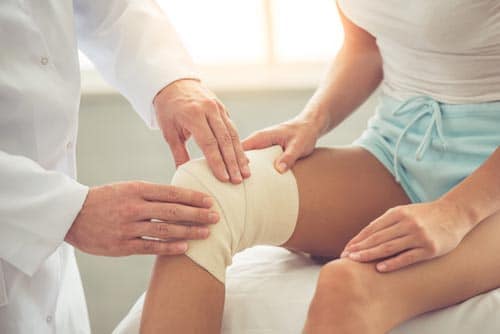More than a quarter of people over age 55 have persistent knee pain. And the most common cause is osteoarthritis.1
Mainstream medicine has two primary solutions for knee pain. One is bad. The other is worse.
Most doctors will treat you with drugs. And if that doesn’t work, they’ll offer meniscal surgery. Neither option is effective. Both can be harmful.
The standard drugs for osteoarthritis are ibuprofen and naproxen. They often don’t put much of a dent in the pain. And they can trigger heart attacks or strokes when taken over the longer term.2
Steroid shots are another pharmaceutical option. They have long been a mainstay treatment even though studies show they are no better than a placebo for relieving pain. In fact, researchers have found that the injections actually make osteoarthritis worse by causing loss of joint cartilage.3
After drugs, surgery is the next on the list of conventional remedies. That usually means an arthroscopic procedure to remove damaged cartilage. About 700,000 of these surgeries are performed in the U.S. every year.
But several large trials have found the meniscus repair does nothing to relieve knee pain.4
The last resort is knee-replacement. This is major surgery. It requires a long rehabilitation. And it seldom restores full function. More than half of replacement patients say their activities are limited because of their knees.5
No Drugs, No Surgery… No Knee Pain
Now there may be a better way.
It is noninvasive, doesn’t come with the heart dangers of painkillers, and it doesn’t cause cartilage damage like steroid shots.
It’s called cooled radiofrequency ablation (CRFA). A new study shows that CRFA is vastly superior to steroid shots at relieving pain and improving knee function.
Dr. Leonardo Kapural is a researcher with the Center for Clinical Research in Winston-Salem, N.C. He led a study in which 151 patients with knee osteoarthritis were randomly treated with either CRFA or steroid shots.
Participants had suffered chronic knee pain for an average of about 10 years.6
CRFA uses radiofrequency energy to interrupt pain transmission from the genicular nerve of the knee.
Before the procedure, a local anesthetic is applied to the genicular nerve to confirm that numbing it reduces the patient’s knee pain. If it works, a special machine is used to send radio waves into the nerve. There is no pain during the treatment. And it’s an outpatient procedure.7
In the study, CRFA patients initially got about the same relief as those getting steroid shots. Before the procedure, they rated their pain a 7 on a scale of 1 to 10. Afterward it was a 3. The steroid group went from a 7 to a 4.
But six months later, the CRFA group still had reduced pain. The pain had returned in most of the steroid group.
CRFA also helped knee function. After six months, 40% of the CRFA group reported “satisfactory” function. This compares to only 3% of the steroid group.
More than 90% of the CRFA group reported their overall health was better. This presumably is because they were able to exercise without pain. Just 24% of the steroid group said their health was better.
“This study demonstrates that CRFA is an effective long-term therapeutic option for painful knee osteoarthritis,” said Dr. Kapural.
He and his colleagues are planning further research to see if the benefits of CRFA persist for a year or more. If it does not, they say that repeating the CRFA procedure is a “reasonable and sensible” option.
The new study was published in a recent issue of the journal Regional Anesthesia & Pain Medicine.
CRFA is available at major pain and orthopedic clinics around the country. You can find a directory of doctors who offer it here.
Editor’s Note: There are powerful, natural solutions that can help you conquer arthritis pain… Like the desert herb that may replace pain prescriptions for both osteoarthritis and rheumatoid arthritis.
Get all the details HERE.
Like this Article? Forward this article here or Share on Facebook.
References:
1 https://www.ncbi.nlm.nih.gov/pmc/articles/PMC3766936/
2 https://www.webmd.com/heart/news/20150710/fda-warning-nsaids-heart_risks#1
3 https://www.medicalnewstoday.com/articles/317476.php
4 http://www.mdalert.com/article/surgery-for-torn-meniscus-in-the-knee-is-often-unnecessary-ineffective-misdirected
5 https://www.ncbi.nlm.nih.gov/pubmed/15685070
6 https://www.eurekalert.org/pub_releases/2017-11/wkh-npi110217.php
7 https://www.eurekalert.org/pub_releases/2017-11/wkh-npi110217.php

